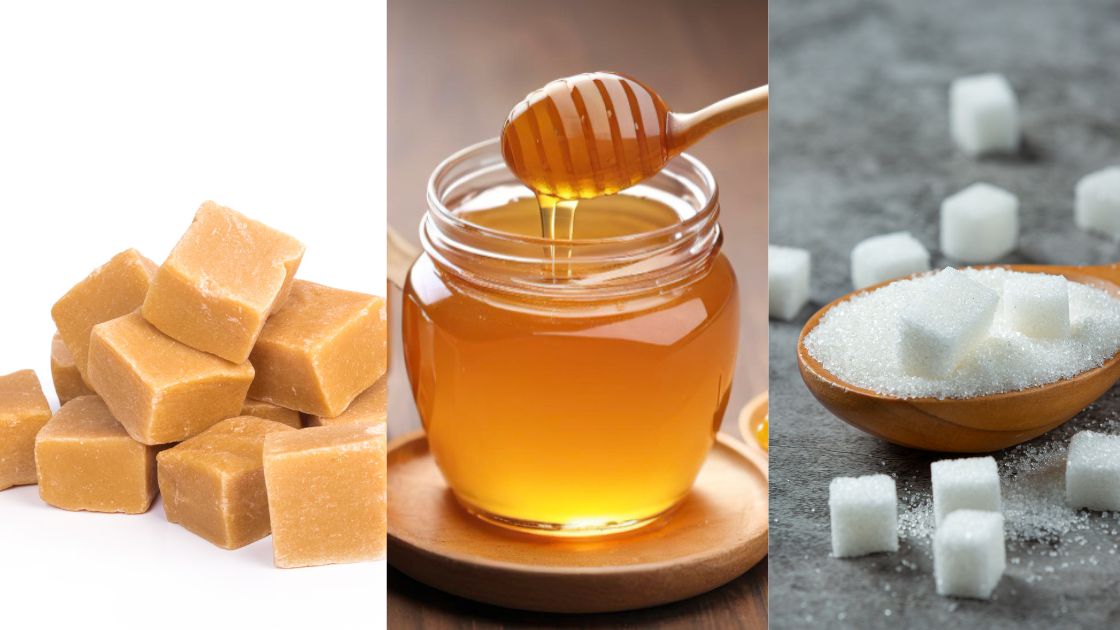
Neem vs Manuka Honey: Benefits, Uses, and Which is Best for Health?
Honey has long been known for its various medicinal and other associated benefits, including skincare and hair health.
Besides, its primary function as a natural and healthy sweetener in desserts and various recipes cannot be overstated. Honey is essentially a by-product of the nectar of flowers in the upper aero-digestive tract of a bee.
Based on organoleptic characters and the primary plant from which the bees of the collected honey acquire nectar, it is used to determine the different honey types.
At present, there are over 15 varieties of honey available on the market, with Neem honey and Manuka honey being the most popular ones. Knowing the differences and individual benefits of Neem honey vs Manuka honey is essential to knowing which one to use and for what.
Neem Honey vs Manuka honey
Both Neem honey and Manuka honey come from the nectar of flowers, but based on the flower types and region, their taste and nutritional compositions vary. This results in different purposes served by each.
|
Basis of Comparison |
Neem Honey |
Manuka Honey |
|
Source |
Nectar of Neem flowers |
Pollination of Manuka plant flowers |
|
Native |
Himalaya region |
New Zealand and Australia |
|
Taste |
Sweet and slightly bitter with an essence of Neem. |
Sweet caramel-like with a bittersweet end note. |
|
Colour |
Dark brown |
Dark cream to brown |
|
Nutritional Value |
Antioxidants, flavonoids, vitamins, minerals, probiotics, amino acids |
Vitamins, minerals, enzymes, antioxidants |
|
Cooking uses |
As spreads, with tea, for basting meats |
Baking, spreads, dessert fillings, as a sweetener to teas |
|
Anti-bacterial, anti-fungal, anti-inflammatory, digestive aid, good for skin, |
Cough and cold, wound healing, oral health, skincare, gastric ulcer, anti-bacterial |
Origin of Neem and Manuka Honey

Neem honey is formed when the Apis mellifera bee collects nectar from Neem flowers and then produces honey. It is usually found in places where there are a lot of Neem trees. However, the origin and most authentic source of Neem honey is the Himalayan region. The nectar for Neem honey is usually collected during the brief one-month period of March when Neem flowers blossom and enable the bees to collect it.
Manuka honey comes from the nectar collected from the flowers of the Leptospermum scoparium bush, commonly known as Manuka bush. Then, the Apis mellifera bees undertake their own process of adding enzymes and reducing water content to create the honey. Manuka honey is usually native to New Zealand and Australia. The bees collect the Manuka nectar in brief four to six-week periods during a specific time of the year when the Manuka flowers blossom.
Flavour and Taste Difference in Neem and Manuka Honey
Both Neem honey and Manuka honey have distinct flavour profiles based on their unique sources. Neem honey is much of an acquired taste. It mimics warm notes of caramel, molasses and burnt sugar when it hits the taste buds. As the taste develops, an earthy and coppery flavour with the bitterness of Neem is felt.
Authentic Manuka honey has a medium-sweet taste and some enjoyable nutty notes. The end note is slightly bitter, which seems pleasant and adds to the taste. Manuka honey, in essence, has a unique flavour that words cannot justify.
Difference in Nutritional value Neem and Manuka Honey
Neem honey is rich in a number of essential nutrients. This includes B vitamins, iron and calcium. It is also packed with antioxidants and anti-bacterial properties, which are characteristic of Neem trees.
Manuka honey has various vitamins and minerals as well, which help in overall health and well-being. This includes B vitamins, calcium, magnesium, sodium, zinc, potassium, copper, and iron.
Also, check out: best honey in India
Neem Honey Benefits
The various benefits of Neem honey are listed below.
- Immunity boost: The high quantities of vitamins and minerals present in Neem honey make it an excellent way to boost your immunity if consumed daily as a part of a balanced diet.
- Antioxidant: Neem honey's antioxidant properties help prevent cellular damage and promote overall health. Having Neem honey on an empty stomach with warm water can cleanse the body and help you feel re-energised.
- Digestive aid: Neem honey helps in improving digestive functions.
- Cough and cold: The anti-inflammatory benefits of Neem honey include helping cure cough and cold and also curing respiratory infections.
- Skincare: Neem is rich in Vitamin E. Neem honey is great for reducing pimples and severe acne if added to a diet or applied with face masks.
- Heart Health: Neem is known to lower blood pressure and control cholesterol levels, which promotes a healthy heart. Neem honey also reflects these benefits of Neem and helps maintain a healthy heart if consumed in a balanced diet.
Manuka Honey Benefits

The different benefits of Manuka honey are detailed below.
- Wound healing: Manuka honey helps heal wounds by increasing tissue regeneration and lowering the pain caused by burns.
- Oral health: According to research, Manuka honey plays a major role in promoting positive oral health by fighting bacteria that cause tooth decay, gum inflammation and tooth decay.
- Cough relief: A teaspoon of Manuka honey can help relieve severe cough caused by URTIs or upper respiratory tract infections.
- Gastric ulcer prevention: Manuka honey has some role in curing gastric ulcers caused by the bacteria H. pylori. In a study conducted on 294 people between 18 and 69 years of age, people who had Manuka honey for more than a week showed lower risks of H. pylori infections.
- Acne treatment: the anti-bacterial properties of Manuka honey help prevent acne. It can be used in face masks or through soaps.
- Digestive aid: Manuka honey can help reduce IBD and promote proper digestive functions. It helps prevent diarrhoea and bowel inflammation.
Conclusion
The choice between Neem honey and Manuka honey comes down to personal preferences and specific uses. While both can be used for cooking and sweetening purposes, their medicinal benefits should be evaluated appropriately and then used. It is always better to consult a physician in case of any confusion.
FAQs
1. Is Manuka honey better than regular honey?
Manuka honey has significantly more anti-bacterial and anti-inflammatory properties than regular honey. It thereby serves a wide range of medicinal purposes, including cough, cold, burns, wounds, etc.
2. Does Neem honey taste bitter?
Neem honey is dark and moderately sweet. It has a slightly bitter taste that comes from Neem.
3. Is Neem honey useful?
Yes. Neem honey has a wide range of anti-bacterial and anti-inflammatory properties. It helps with digestion, acne prevention, and cold relief. Besides, it is also used as a healthy alternative to sugar in herbal teas.
4. Is Manuka honey a superfood?
The rich quantities of vital vitamins and minerals in Manuka honey make it a superfood. It thereby has various health benefits.
5. Can I consume Manuka honey every day?
Yes. It is usually safe to consume manuka honey as a part of a balanced diet. The recommended amount for adults is one teaspoon. Children under a year of age should not be given this.
6. Can I take Neem honey on an empty stomach?
Being derived from Neem flowers, Neem honey possesses a lot of the health benefits of a Neem tree, which is widely regarded in Indian Ayurveda. Taking Neem honey on an empty stomach can help cleanse the entire body and promote detoxification.
Don't miss out on our other Honey comparisons:
Maple Syrup vs Honey | Manuka vs Acacia Honey | Manuka vs Buckwheat honey | Clover vs Wild Flower Honey | Set vs Clear Honey | Sugar vs Jaggery vs Honey | Wildflower vs Regular Honey | Organic vs Regular Honey






